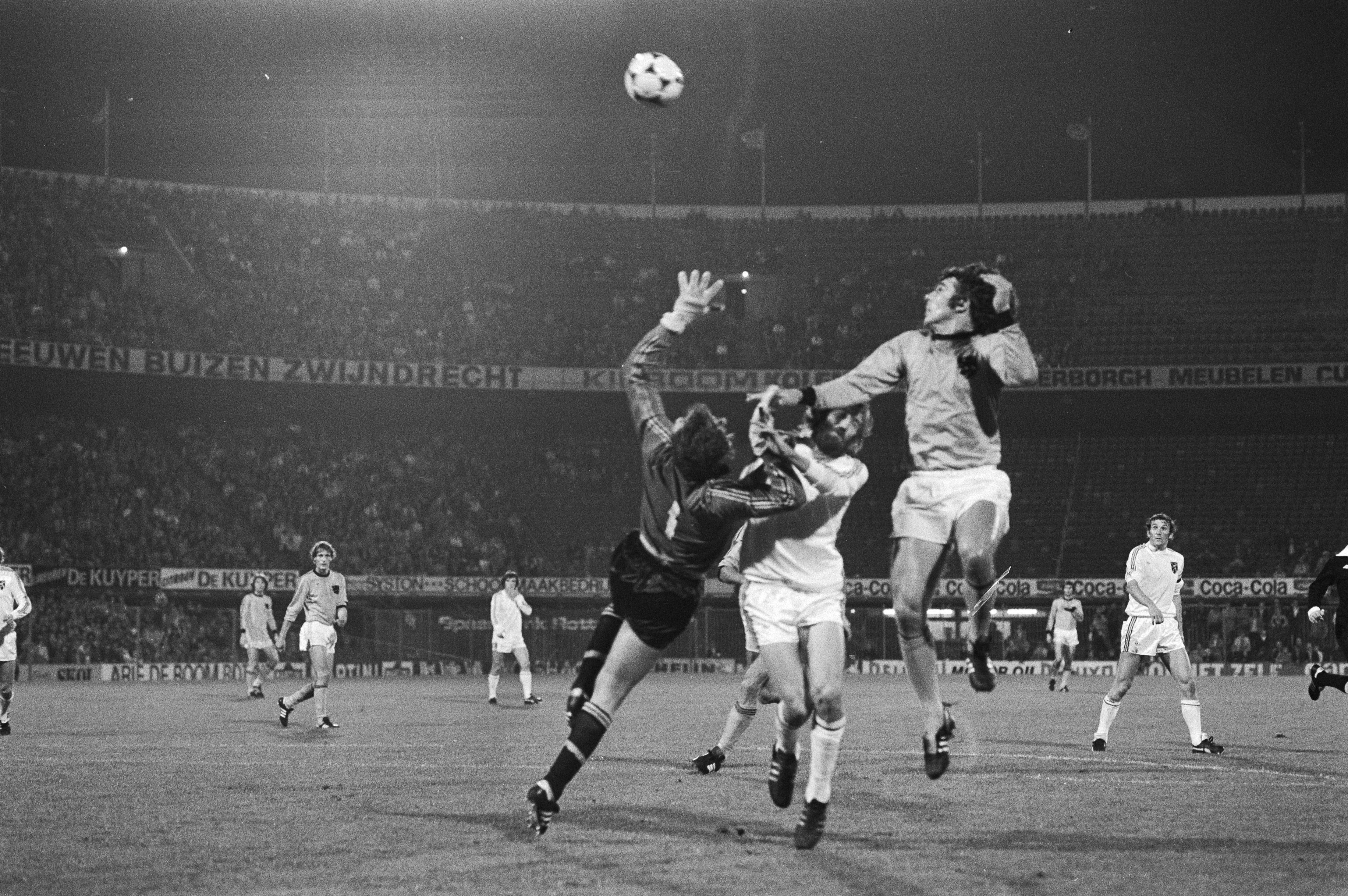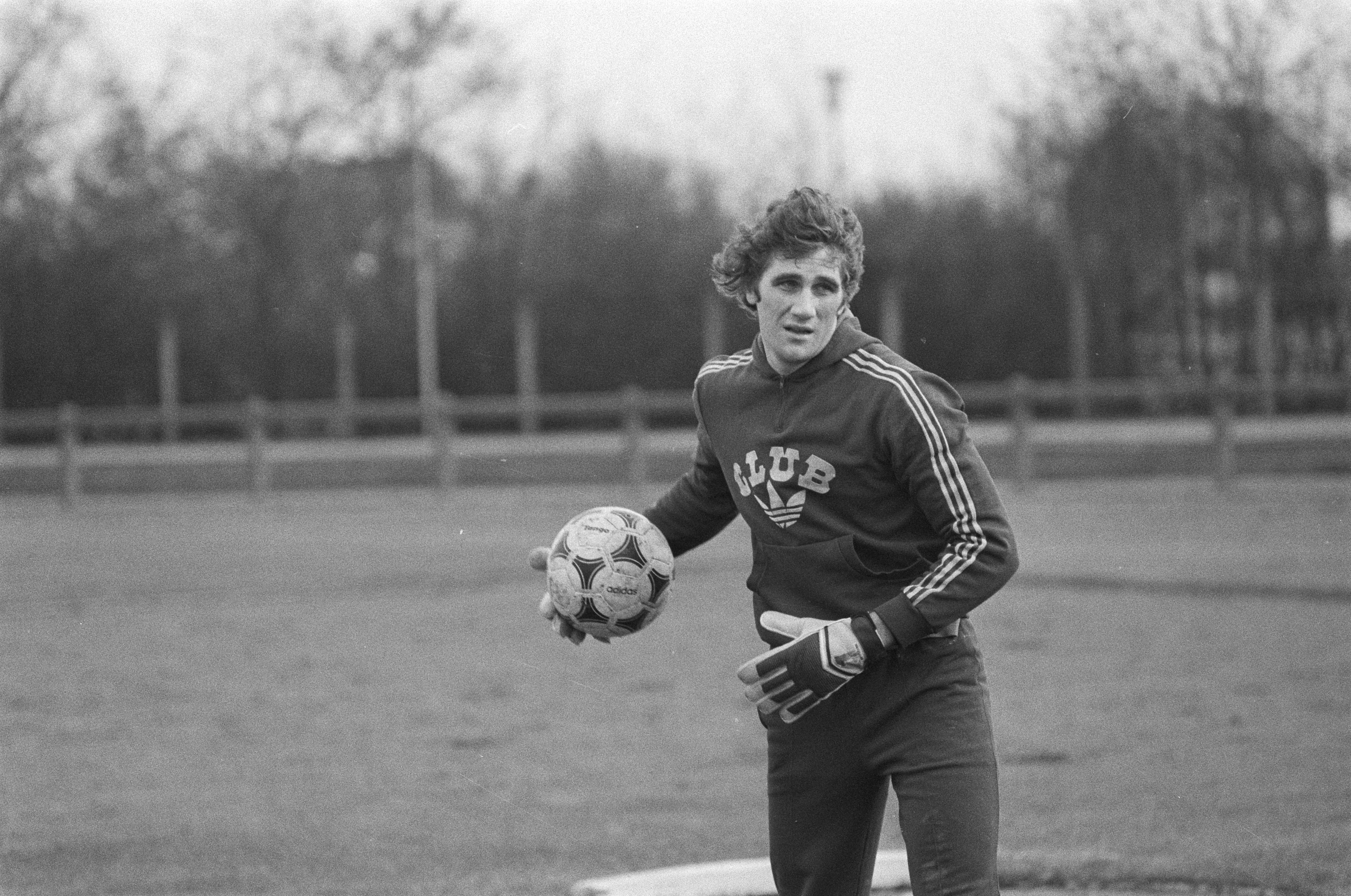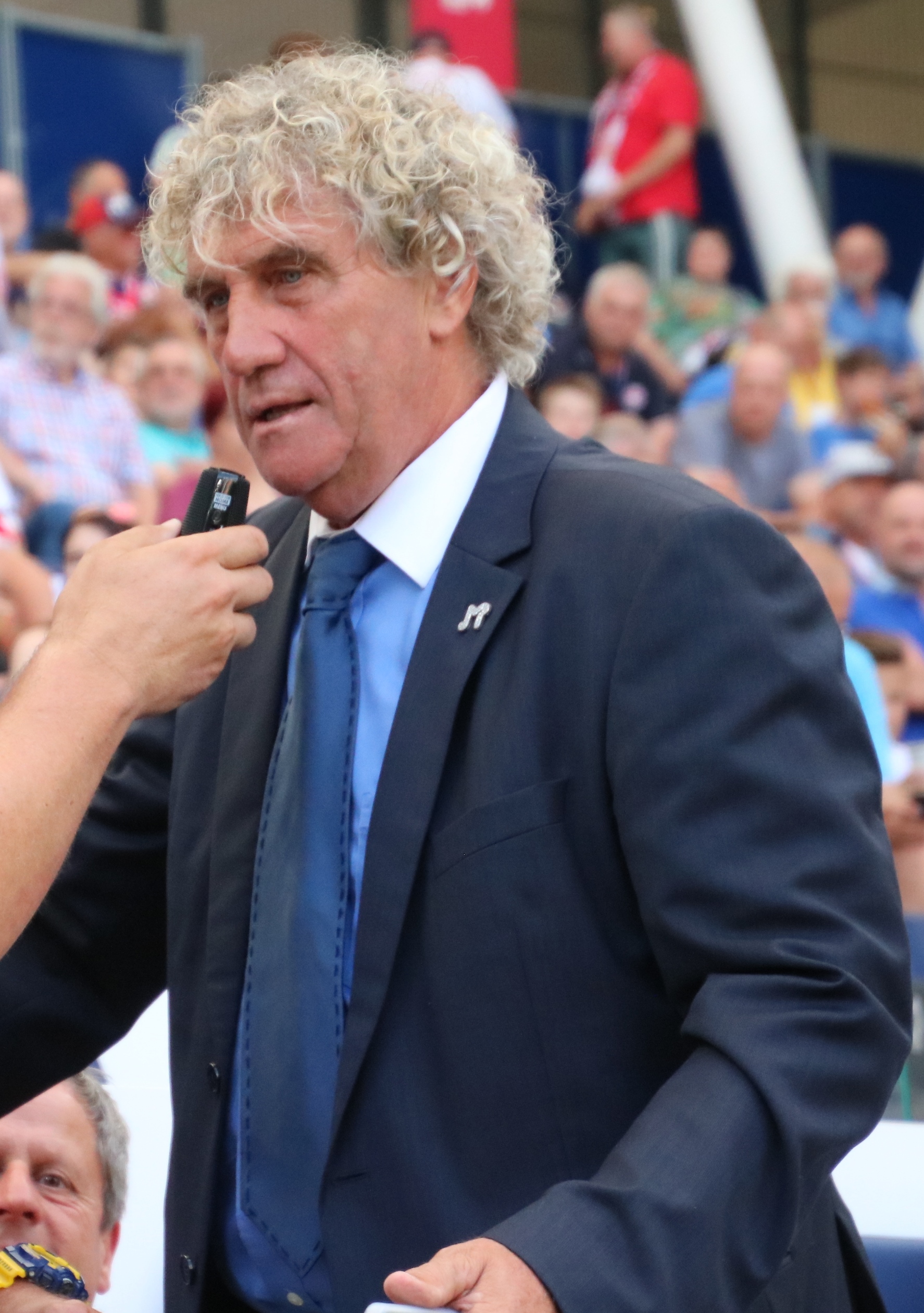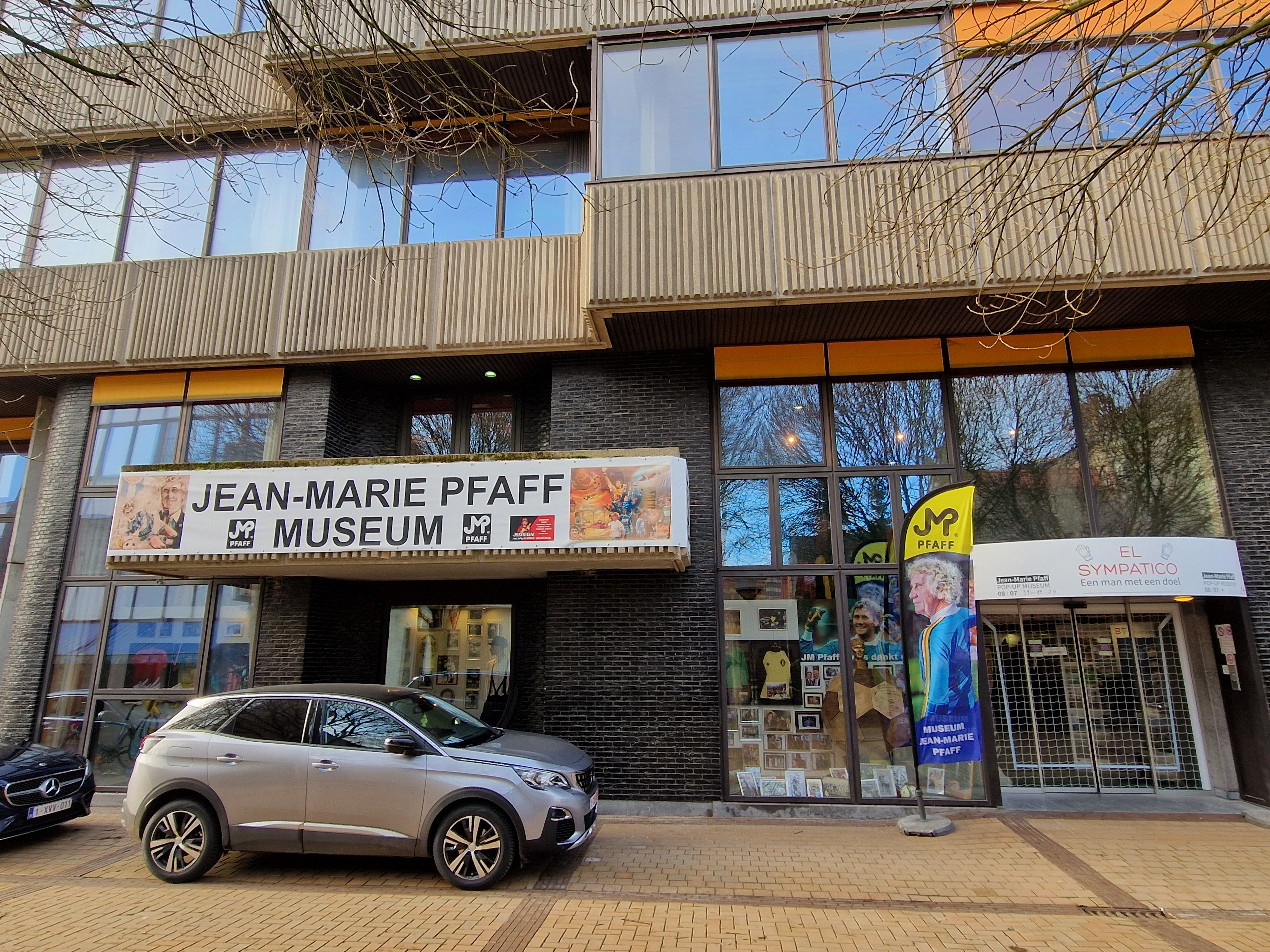1. Early life
Jean-Marie Pfaff was born on December 4, 1953, in Lebbeke, East Flanders, Belgium. He grew up in a large family with 12 children, comprising six boys and six girls. His father worked as a door-to-door salesman of fabrics and carpets, and during summers, the entire family lived in a caravan in Lebbeke and assisted their father with sales. Tragically, Pfaff's father died of cancer when Jean-Marie was barely 12 years old, an event that had significant consequences for the family.
Pfaff's natural talent as a goalkeeper was quickly recognized during his time as a street footballer. He began his youth career at S.C. Eendracht Aalst, joining his older brothers, Louis and Jean-Baptist Pfaff. In 1965, when Louis and Jean-Baptist transferred to K.S.K. Beveren, Jean-Marie and his younger brother Toon also made the move to the Waasland-based club. Pfaff officially joined K.S.K. Beveren at the age of 16.
2. Club career
Jean-Marie Pfaff's club career was marked by significant success, particularly during his time at Beveren and Bayern Munich, where he won multiple domestic titles and earned international recognition for his goalkeeping prowess.
2.1. K.S.K. Beveren
Jean-Marie Pfaff officially joined the youth ranks of K.S.K. Beveren at the age of 16. He made his senior debut for the club at the end of the 1971-72 season, at 18, though the club was relegated to the second division that year. In the subsequent 1972-73 season, Pfaff became the regular starting goalkeeper, and Beveren secured the second division championship, earning immediate promotion back to the top flight.
Initially, he faced competition for his starting spot, being benched briefly by coach Jef Jurion in the latter half of the 1973-74 season. However, under the guidance of coach Urbain Braems, Pfaff firmly re-established himself as the primary goalkeeper for the 1974-75 season.
The 1977-78 season marked a breakthrough for Beveren, as they finished fifth in the league and, for the first time in their history, reached the Belgian Cup final. Pfaff played a decisive role in their 2-0 victory against Charleroi in the final, making several crucial saves to secure the club's first major trophy and a spot in European competition. In recognition of his outstanding performances, Pfaff was awarded the Belgian Golden Shoe in 1978, a rare honor for a goalkeeper.
Beveren's pinnacle came in the 1978-79 season, when the club won its first national championship, with Pfaff achieving an impressive 17 clean sheets in the league. In the European Cup Winners' Cup, Beveren surprised many by eliminating Inter Milan in the quarter-finals, largely due to Pfaff's strong displays. Their European journey ended in the semi-finals against Barcelona, where they lost two legs, both 1-0, with the goals conceded being penalties-the first goals Pfaff had allowed in the tournament.
In 1980, Beveren again reached the Belgian Cup final, propelled by Pfaff's brilliant performance in the semi-final return leg against Standard Liège. However, they suffered a surprising 1-2 defeat to underdog Thor Waterschei, missing out on European qualification. The 1980-81 season ended on a sour note for Pfaff, as he received a four-month suspension from the RBFA on March 11, 1981, following an alleged incident where he kneed linesman Thirion after a cup match against Lokeren. Later television footage, however, indicated that no such knee strike had occurred.
After the 1982 FIFA World Cup, the 28-year-old Pfaff transferred to the German top club FC Bayern Munich for a fee equivalent to 400.00 K EUR. During his time at Beveren, he made 305 appearances.
2.2. FC Bayern Munich
In 1982, following the FIFA World Cup, Jean-Marie Pfaff made a significant move to the German football powerhouse, FC Bayern Munich. This transition exposed him not only to a new footballing culture but also to the immense pressure associated with playing for an elite club. Despite a challenging debut against Werder Bremen, where he misjudged a long throw-in, resulting in an own goal, Pfaff quickly integrated into the team and became an indispensable component. He was effectively seen as the long-awaited successor to Bayern legend Sepp Maier, whose career had ended abruptly due to a car accident three years prior.
Pfaff's inaugural season (1982-83) at Bayern proved to be disappointing for the club across all competitions. They were eliminated in the second round of the German Cup by Eintracht Braunschweig and finished fourth in the 1982-83 Bundesliga. In the European Cup Winners' Cup, Bayern was knocked out in the quarter-finals by the eventual winners, Aberdeen. Despite the team's struggles, Pfaff's strong performances in the latter half of the season earned him the distinction of being named a "world-class goalkeeper" by the prominent German football magazine Kicker in July 1983.
In the 1983-84 season, Bayern again secured a fourth-place finish. In the second round of the UEFA Cup, after two goalless draws against PAOK, Pfaff famously saved Konstantinos Malioufas' penalty and then scored Bayern's tenth penalty himself in the ensuing shootout. However, their European campaign ended prematurely in the third round against Tottenham Hotspur. On May 31, 1984, Bayern claimed the DFB-Pokal, defeating Borussia Mönchengladbach in the final via a penalty shootout, where Pfaff saved Norbert Ringels' attempt, setting up Michael Rummenigge for the winning goal.
The 1984-85 season saw Pfaff win his first Bundesliga title with Bayern Munich, finishing four points clear of Werder Bremen. In the Cup Winners' Cup, they reached the semi-finals after two impressive victories against Roma, but were ultimately eliminated by English side Everton. Bayern also reached the DFB-Pokal final again, but surprisingly lost 1-2 to Bayer Uerdingen at the Olympiastadion in Berlin.
The first half of the 1985-86 season was challenging for Pfaff due to injuries, which led him to temporarily lose his starting position and worry about his selection for the 1986 FIFA World Cup in Mexico. However, his strong determination enabled him to make a comeback and silence his critics. Bayern concluded the league season with the same points as Werder Bremen but secured the title due to a higher number of wins, marking their second consecutive Bundesliga championship. They also celebrated another DFB-Pokal victory, comfortably beating VfB Stuttgart 5-2 in the final. Their European Cup journey ended in the quarter-finals with a 0-2 defeat to Anderlecht in Brussels. Following his impressive return to form, Pfaff was once again rated as "world class" by Kicker.
The 1986-87 Bundesliga was convincingly won by Bayern for the third consecutive time, with a six-point lead over Hamburger SV. Their DFB-Pokal campaign ended earlier that season with a 0-3 defeat to Fortuna Düsseldorf in November. In the European Cup, Bayern successfully eliminated Anderlecht with two victories. They also advanced past Real Madrid, despite losing the second leg at the Bernabéu, after a commanding 4-1 victory in the first leg. The final was held on May 27, 1987, at the Praterstadion in Vienna, where Bayern, affected by key player suspensions and injuries, lost 1-2 to FC Porto. For his outstanding performances with both Bayern and the Belgian national team at the 1986 World Cup, Pfaff received the inaugural IFFHS World's Best Goalkeeper award in 1987 from the IFFHS.
In the 1987-88 season, Bayern finished second, losing the title to Werder Bremen. They were eliminated in the quarter-finals of both the German Cup (against Hamburger SV) and the European Cup (against Real Madrid). After six seasons, Pfaff made a total of 156 appearances for Bayern Munich.
2.3. Later career
At 35, Jean-Marie Pfaff decided to return to his home country, Belgium, signing a contract with Lierse S.K.. The significant difference in competitive level compared to Bayern Munich did not deter him. During the 1988-89 season, Lierse finished in a respectable tenth place in the league table. Pfaff made 23 appearances for Lierse S.K.
After just one season in Belgium, Pfaff accepted an invitation from his former coach, Urbain Braems, to join him at Trabzonspor in Turkey. Pfaff received a heroic welcome upon his arrival at the Turkish club. The team finished third in the 1989-90 1.Lig and secured qualification for the European Cup Winners' Cup despite losing the final of the Turkish Cup to Beşiktaş. The Turkish Cup final proved to be Pfaff's last professional game, as he decided to retire from his 18-year goalkeeping career in 1990. Despite facing increasing injury problems, he later expressed regret about retiring at the age of 36. Pfaff made 25 league appearances and a total of 33 appearances for Trabzonspor.
3. International career
Jean-Marie Pfaff was a pivotal figure for the Belgium national football team for over a decade, participating in numerous major tournaments and achieving significant success, most notably in the UEFA Euro 1980 and the 1986 FIFA World Cup.
3.1. Early appearances
In 1976, Guy Thys, the new coach of the Belgium national team, embarked on a rejuvenation of the squad, affectionately known as the "Red Devils," in preparation for UEFA Euro 1976. Jean-Marie Pfaff was among the young, promising talents called up, alongside players like Willy Wellens, René Verheyen, and Michel Renquin.
Pfaff's international debut was a memorable one, occurring in the quarter-finals of the UEFA Euro 1976 against the formidable Dutch team led by Johan Cruyff. Despite the high stakes, Pfaff performed admirably. He famously intimidated Johan Neeskens, causing him to miss a penalty. Belgium initially took the lead through a goal by Roger van Gool, but the Netherlands equalized via Johnny Rep and ultimately secured a 2-1 victory with a brilliant lob from Cruyff. Pfaff's sportsmanship was evident as he left the field smiling, congratulating Cruyff, stating that despite the loss, Cruyff's goal was beautiful, and his sense of fair play compelled him to offer compliments.

Pfaff continued to be a crucial player for the national team, playing a pivotal role in the UEFA Euro 1980 tournament held in Italy. His decisive saves were instrumental in guiding Belgium to the final against West Germany. Although Belgium narrowly lost the final 1-2, their performance marked them as an emerging force in international football, with Pfaff standing out as a star player.

3.2. FIFA World Cup appearances
The 1982 FIFA World Cup in Spain was highly anticipated for Belgium. They notably won the tournament's opening game against Argentina. Jean-Marie Pfaff performed at a consistently high level during the group stage. However, his participation was cut short in the third match against Hungary when he collided with teammate Eric Gerets, resulting in both players being injured and forced to return home. Without these two key players, Belgium was subsequently eliminated after the second group stage. Pfaff later reflected that had he and Eric Gerets not been injured, Belgium could have potentially reached and even won the final, stating they would not have feared any opponent, including Brazil or Italy.
Pfaff also represented Belgium at the UEFA Euro 1984 tournament, where the "Red Devils" did not advance past the group stage, finishing third in Group A behind France and Denmark.
Two years later, Belgium qualified for the 1986 FIFA World Cup in Mexico. This tournament proved to be a significant highlight in Pfaff's career, establishing him as one of the World Cup's standout stars. Leading up to the tournament, Pfaff had battled a serious injury and was competing for his starting spot with Jacky Munaron of Anderlecht. Coach Guy Thys had promised him a place in the squad for Mexico if he regained his regular starting position at Bayern Munich.
Belgium emerged as the surprise team of the 198 Cup. Pfaff, affectionately nicknamed 'El Simpático' (El SimpáticoMr. Nice GuySpanish) by the Mexican football fans, delivered exceptional performances throughout the tournament, making numerous crucial saves, particularly against the Soviet Union in the eighth-final. His contributions were instrumental in leading his team to the semi-finals. In the semi-final, Belgium faced Diego Maradona's Argentina, who ended the Red Devils' dream with two goals from Maradona. Pfaff recalled that the team's mood before this match was similar to that before the 1980 European Championship final, with a strong conviction that they had little chance and immense respect for both Germany and Argentina. He also mused that if a player like Ludo Coeck had been present, Maradona might not have been able to dribble past their entire defense so easily.
Belgium ultimately secured a fourth-place finish, losing the consolation final 2-4 to Michel Platini's France. Upon their return home, the team received a hero's welcome from approximately 10,000 fans who gathered to celebrate on the Grand-Place in Brussels. Pfaff was recognized for his outstanding performance with the FIFA World Cup Golden Glove award and was selected for the FIFA World Cup All-Star Team. He was also placed fourth in the FIFA World Cup Golden Ball voting, tied with Michel Platini.
3.3. International retirement
Jean-Marie Pfaff's international career with the Belgium national team concluded in 1987, when he was 33 years old. His final international appearance was on September 23, 1987, in a match against Bulgaria. He was subsequently succeeded as Belgium's primary goalkeeper by Michel Preud'homme. Pfaff accumulated a total of 64 caps for his country.
4. Style of play
Despite his sturdy physical build, Jean-Marie Pfaff was renowned for his quick reflexes and spectacular, often acrobatic, saves, making him an exceptionally effective shot-stopper. Beyond his technical skills, he was characterized by an extroverted, outspoken, lively, and eccentric personality. Pfaff was also recognized for his strong and charismatic leadership qualities, as well as his confidence, commitment to fair play, and professionalism. These traits made him an excellent organizer of his defense and a highly popular figure among fans. His cheerful attitude on the pitch and humorous demeanor during the 1986 FIFA World Cup in Mexico earned him the nickname 'El Simpático' (El SimpáticoMr. Nice GuySpanish).
Pfaff excelled at quickly rushing off his line to intercept attacks. Although not the tallest goalkeeper, his large hands were a significant asset when claiming the ball, contributing to his authoritative presence in goal. He was also widely praised for his ability to stop penalties. While he was highly regarded for his goalkeeping prowess, considered one of the world's best during his prime and one of Belgium's greatest goalkeepers ever (with some even ranking him among the best of all time), he was also known to exhibit occasional inconsistencies and be prone to errors.
5. After retirement
Following his retirement from professional football, Jean-Marie Pfaff embarked on various endeavors, including a testimonial match, brief coaching stints, and significant involvement in public life, including media appearances, reality television, and museum projects.
5.1. Farewell match
To mark his retirement from football, a grand farewell match was organized for Jean-Marie Pfaff in 1991, held at the Beerschot field. The event featured a "Belgium of the eighties" squad competing against a selection of world stars, including football luminaries such as Franz Beckenbauer, Ruud Krol, Michel Platini, Roger Milla, Alain Giresse, and Søren Lerby. The match garnered significant international attention, being broadcast live in 36 countries.
5.2. Coaching career
Following his playing career, Jean-Marie Pfaff had two brief ventures into football management. He coached KSV Sottegem in 1993 and later took on a coaching role at Oostende in 1998.
5.3. Other activities and public life

Jean-Marie Pfaff has maintained a significant public profile following his retirement from professional football. In March 2004, he was named by Pelé as one of the FIFA 100 list, recognizing him among the top 125 greatest living footballers.
In 2005, Pfaff served as a representative for United Sol Energy, a company that was set to sponsor the former East German record champion BFC Dynamo. He became a member of BFC Dynamo and actively promoted the establishment of a new youth sports school at the club, which was intended to bear his name. Pfaff visited the Sportforum Hohenschönhausen and participated in training sessions with the club's youth teams. However, the sponsorship ultimately did not materialize, and Pfaff resigned from the club and terminated his membership on August 11, 2006.
Pfaff also ventured into acting, with a small role in the 1987 German movie Zärtliche Chaoten (Zärtliche ChaotenTender ChaosGerman). He made guest appearances in the Flemish sitcom F.C. De Kampioenen in 1990 and again in 1999. From 2002 to 2012, he became a prominent television personality in Belgium and the Netherlands through the reality show De Pfaffs, which chronicled his life and family. He also appeared in the 2008 children's movie Plop en de Kabouterbaby (Plop en de KabouterbabyPlop and the Gnome BabyDutch), produced by Studio 100, and had a guest role in the German television series Sturm der Liebe (Sturm der LiebeStorm of LoveGerman) in 2015. In a humorous incident in 2024, an intruder managed to enter the studio of the German football show Doppelpass after security personnel mistook him for the former Bayern Munich goalkeeper.
His personal life is also noted; Pfaff is married and has three daughters: Kelly, Debby, and Lindsey.
In 2018, Pfaff was granted the status of Honorary citizen of Lebbeke, his hometown, and in 2022, he became an honorary citizen of Beveren. In 2023, a pop-up museum dedicated to Jean-Marie Pfaff opened in the former town hall of Beveren. The museum showcases his extensive collection of jerseys, photographs, and other memorabilia accumulated throughout his career. The project proved highly popular, attracting tens of thousands of visitors, and was extended for a third time in early 2025.

6. Honours and awards
K.S.K. Beveren
- Belgian Second Division: 1972-73
- Belgian First Division: 1978-79
- Belgian Cup: 1977-78
- Belgian Supercup: 1979
FC Bayern Munich
- Bundesliga: 1984-85, 1985-86, 1986-87
- DFB-Pokal: 1983-84, 1985-86
- DFL-Supercup: 1987
- European Cup runner-up: 1986-87
Belgium
- UEFA European Championship runner-up: 1980
- Belgian Sports Merit Award: 1980
- FIFA World Cup fourth place: 1986
Individual
- Belgian Golden Shoe: 1978
- Kicker Goalkeeper of the Year: 1983
- Kicker German Football Rankings - World Class Goalkeeper: 1983, 1986
- Ballon d'Or nominations: 1983, 1986, 1987
- European Goalkeeper of the Year: 1983, 1987
- FIFA World Cup All-Star Team: 1986
- FIFA World Cup Golden Glove: 1986
- FIFA World Cup Golden Ball (4th place): 1986
- France Football + La Gazzetta dello Sport + Guerin Sportivo World Cup team: 1986
- IFFHS World's Best Goalkeeper of the Year: 1987
- Belgian Golden Shoe of the 20th Century: 6th place, 1995
- Voetbal International's 50 World Stars by Raf Willems: 1999
- IFFHS World Keeper of the Century: 16th place, 2000
- IFFHS European Keeper of the Century: 10th place, 2000
- Platina 11 (Best Team in 50 Years of Golden Shoe Winners): 2003
- FIFA 100: 2004
- Golden Foot Legends Award: 2014
- World Sports Legends Award: 2016
- Bayern Munich Living Legend: 2017
- Honorary Citizen of Lebbeke: 2018
- IFFHS All Time Belgium Dream Team: 2021
- Honorary Citizen of Beveren: 2022
- Museum Jean-Marie Pfaff in Beveren: 2023
- Pro League Hall of Fame: 2024
7. Books
- Nummer Eén by Marcel Van Bergen, 1979 (Dutch, 209 pages)
- J.M. Pfaff-De Derde Dimensie by Theo Bauwens, 1983 (Dutch, 152 pages)
- De Held van Munchen (celebrity comic) by K. Luyckx and F. Defossez, 1984 (Dutch, 44 pages)
- Das Torwartbuch (Das TorwartbuchThe Goalkeeper BookGerman) by Jean-Marie Pfaff and Sepp Maier, 1984 (German, 222 pages)
- De Pfaffs (celebrity comic) by Ronald Grossey and Charel Cambré, 2003 (Dutch)
- Overleven (OverlevenSurviveDutch) by Jean-Marie Pfaff, 2007 (Dutch, 247 pages)
- J.M. Pfaff-Mein Leben-Vom straßenfußballer zum Welttothuter (J.M. Pfaff-Mein Leben-Vom Straßenfußballer zum WelttorhüterJ.M. Pfaff-My Life-From Street Footballer to World GoalkeeperGerman), 2021 (Dutch, German, 296 pages)
8. Career statistics
| Club | Season | League | National cup | League cup | Europe | Total | ||||||
|---|---|---|---|---|---|---|---|---|---|---|---|---|
| Division | Apps | Goals | Apps | Goals | Apps | Goals | Apps | Goals | Apps | Goals | ||
| Beveren | 1971-72 | First Division | 4 | 0 | - | - | - | 4 | 0 | |||
| 1972-73 | Second Division | 27 | 0 | - | - | - | 27 | 0 | ||||
| 1973-74 | First Division | 32 | 0 | 2 | 0 | - | - | 34 | 0 | |||
| 1974-75 | 36 | 0 | 2 | 0 | - | - | 38 | 0 | ||||
| 1975-76 | 33 | 0 | 1 | 0 | - | - | 34 | 0 | ||||
| 1976-77 | 34 | 0 | 2 | 0 | - | - | 36 | 0 | ||||
| 1977-78 | 34 | 0 | 4 | 0 | - | - | 38 | 0 | ||||
| 1978-79 | 33 | 0 | 4 | 0 | - | 8 | 0 | 45 | 0 | |||
| 1979-80 | 22 | 0 | 8 | 0 | 1 | 0 | 2 | 0 | 33 | 0 | ||
| 1980-81 | 25 | 0 | 4 | 0 | 1 | 0 | - | 30 | 0 | |||
| 1981-82 | 23 | 0 | 6 | 0 | - | 4 | 0 | 33 | 0 | |||
| Total | 303 | 0 | 33 | 0 | 2 | 0 | 14 | 0 | 352 | 0 | ||
| Bayern Munich | 1982-83 | Bundesliga | 27 | 0 | 2 | 0 | - | 4 | 0 | 33 | 0 | |
| 1983-84 | 32 | 0 | 8 | 0 | - | 4 | 0 | 44 | 0 | |||
| 1984-85 | 14 | 0 | 4 | 0 | - | 6 | 0 | 24 | 0 | |||
| 1985-86 | 24 | 0 | 5 | 0 | - | 5 | 0 | 34 | 0 | |||
| 1986-87 | 34 | 0 | 2 | 0 | - | 9 | 0 | 45 | 0 | |||
| 1987-88 | 25 | 0 | 5 | 0 | - | 5 | 0 | 35 | 0 | |||
| Total | 156 | 0 | 26 | 0 | 0 | 0 | 33 | 0 | 215 | 0 | ||
| Lierse | 1988-89 | First Division | 23 | 0 | - | - | 2 | 0 | 25 | 0 | ||
| Total | 23 | 0 | 0 | 0 | 0 | 0 | 2 | 0 | 25 | 0 | ||
| Trabzonspor | 1989-90 | Süper Lig | 25 | 0 | 4 | 0 | - | 4 | 0 | 33 | 0 | |
| Total | 25 | 0 | 4 | 0 | 0 | 0 | 4 | 0 | 33 | 0 | ||
| Career total | 507 | 0 | 63 | 0 | 2 | 0 | 53 | 0 | 625 | 0 | ||
| National team | Year | Apps | Goals |
|---|---|---|---|
| Belgium | 1976 | 1 | 0 |
| 1977 | 4 | 0 | |
| 1978 | 5 | 0 | |
| 1979 | 3 | 0 | |
| 1980 | 8 | 0 | |
| 1981 | 4 | 0 | |
| 1982 | 9 | 0 | |
| 1983 | 4 | 0 | |
| 1984 | 8 | 0 | |
| 1985 | 4 | 0 | |
| 1986 | 10 | 0 | |
| 1987 | 4 | 0 | |
| Total | 64 | 0 | |